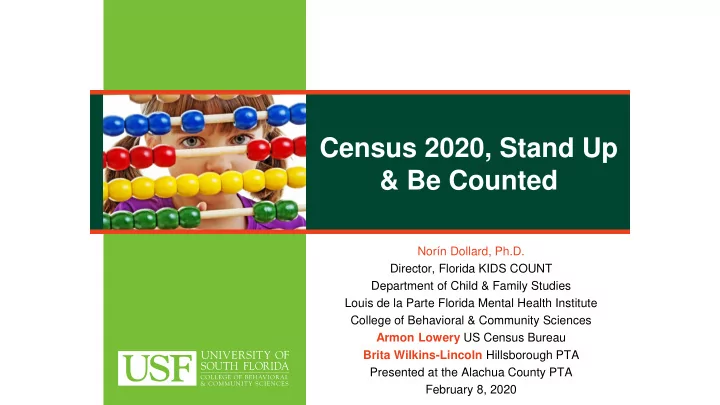

Census 2020, Stand Up & Be Counted Norín Dollard, Ph.D. Director, Florida KIDS COUNT Department of Child & Family Studies Louis de la Parte Florida Mental Health Institute College of Behavioral & Community Sciences Armon Lowery US Census Bureau Brita Wilkins-Lincoln Hillsborough PTA Presented at the Alachua County PTA February 8, 2020
• Thanks to Annie E. Casey Foundation, NALEO, the Partnership for America’s Children (countallkids.org) and the Census Bureau
What is the Census? o 10 Year “Roll Call” • A count- of the U.S. Population • A snapshot of population characteristics
Why is the Census important? • Federal and State Reapportionment • “Redistribution of Representation” • Redistricting Political Boundaries (Congressional, Legislative, County Commission, City Council, School Board) • Census data will help plan for the next 10 years o Data commonly used for writing grants to bring resources to the community
When Does the Census Begin?
What’s new this time? • The Census will be web-based not paper - based
Hard to Count Areas • Primary Focus: • Households in 12 Census tracts had Waldo low response rates in 2010. 52,708 people lived in those communities in 2013-17. Newberry Gainesville • Communities with limited internet or other barriers to completion • Migrant populations • Secondary: Hard to count areas: • All other Alachua County residents https://www.censushardtocountmaps2020.us/
Who doesn’t get counted? • People in complex households – blended and multigenerational families or non-relatives • Cultural and linguistic minorities • People displaced by disasters, e.g., Hurricanes Maria & Michael • People in poverty • People in multi-unit and rental properties • Mixed status families or recent immigrants • Very young children • People who move frequently • People with less than a high school education
Many of our families match the profiles of the hard-to count – Alachua • 20% of residents live in hard to count census tracts (N = 52,708) • Mobile / homeless people (714 in 2019) and students (1,021 in 2017-18) • Non-English speaking (2% or 1,995) households have limited English proficiency • High mobility, 16% of children moved in the past year • Residents living in poverty (22% 54,072) (add children in high poverty?) • Living in rental households (45%, N=43,854 households) • Limited access to the internet (12% of households have no internet or dialup N= 11,824) • Grandparents responsible for their own grandchildren (N=1, 641)
Why do we care? Recap • Redistricting and apportionment – we gained 2 seats in 2010 and stand to gain at least one more • Federal funding - $44B returns to Florida each year based on allocations derived from Census data
Undercount • Statewide, >71,307 0-4 year olds were undercounted in 2010 (6.2%) • We are missing $67M dollars annually because of the young child undercount
Census Bureau messaging research (CBAMS) – opportunities for education • Respondents with young children with low income and education were most concerned about – Confidentiality – Data sharing – Fear of government repercussions – Had the lowest level of intention to respond to the census childrenhttps://www.census.gov/programs-surveys/decennial-census/2020- census/planning-management/final-analysis/2020-report-cbams-attitudes-reporting- children.html and without
What messaging works? • Knowledge of the Census and its impact – E.g., Census is used to determine funding for important services (school, child care, transportation) • The effects of the Census count last for a decade, which may be longer than their child’s lifespan • Use trusted voices
Why involve the schools? • Schools, their faculty and staff are trusted community voices and we need them to ensure a maximum count • Census research shows that people who are likely to complete the Census – Feel schools, childcare and job training are important – Feel the most important reason to respond to the Census was to determine funding for their community
What can you do? • Educate yourself and your staff on the importance of the Census • Find your local Complete Count Committee and get involved • Reach out to your local Census Partnership specialist • Increase awareness and engagement: – Educate staff to ensure they complete their own Census – Train staff in the public facing parts of your organization to be Census Ambassadors
What else can schools do? 1. Issue a proclamation in support of the Census 2. Co-branding the Census with existing school initiatives 3. Educate constituents on the importance of the Census 4. Engage Principals, Head Start Directors and Area Directors – encourage use of monthly newsletters, telephone and social media 5. Engage Teachers with Statistics in Schools curricular enhancements based on the census for civic engagement and STEM classes 6. Engage Students and Parents – provide coloring books, stickers, and other materials 7. Other Census activities with approval of District Leadership
The importance of schools to the Census and the importance of the Census to the schools • The Complete Count Committee needs schools and PTSAs because they are the trusted voices of the community • Schools need the maximum Census count because it establishes the funding allocations for the next ten years
What can you do? • Find and train the trusted messengers – schools and community-based organizations have a big role here • Use messaging guidance from the Census Bureau and other organizations to target Hard To Count communities and populations – Checkout https://2020census.gov/en/partners
Resources
What resources are out there? • Use trusted sources of information like countallkids.org, Visit floridakidscount.org • https://www.miamidade.gov/global/census2020/hom e.page • Statistics in Schools • https://census.gov/schools?utm_source=google&ut m_medium=cpc&utm_campaign=branded&utm_con tent=general&utm_term=statistics%20in%20schools
Thank you Questions? Norín Dollard, Ph.D. dollard@usf.edu (813) 974-3761 Visit our website http://floridakidscount.org/ Like us on Facebook & follow us on Twitter @FLKidsCount
Recommend
More recommend